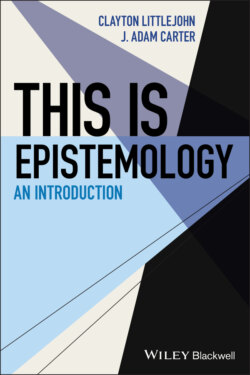Читать книгу This Is Epistemology - J. Adam Carter - Страница 25
2 PERCEPTION 2.1 Introduction
Оглавление2.1 Let's pick up on something from the previous chapter, the isolation objection to coherentism. You're walking along a path and you turn a corner. You had no expectations about what you'd see when you turned this corner. You certainly didn't expect to see a pig, but there it is, standing before you. Those who didn't tread this path might have had some reason to think that a pig would be here. They might have noticed some nearby buckets of pig food or heard tales of this pig. Now that you've turned the corner and see what you do, your situation is different to theirs.
2.2 As J.L. Austin (1962) succinctly puts it:
if the animal then emerges and stands there plainly in view, there is no longer any question of collecting evidence: its coming into view doesn't provide me with more evidence that it's a pig, I can now just see that it is, the question is settled.
(Austin 1962, p. 115)
Before you saw it, it would have been unreasonable to believe that a pig was present. After you saw it, however, the question is settled. It would be unreasonable now not to believe there is a pig standing before you. What changed between then and now that accounts for this significant change in your epistemic position? The obvious answer is that the pig came into view. A pig standing there unobserved (e.g. hiding behind a tree, or wearing an invisibility cloak) wouldn't improve your epistemic position. Seeing it makes all the difference. The change in your visual experience is the obvious explanation as to why it is now rational to believe something it wasn't rational to believe before.
2.3 Remember the difficulty that this poses for coherentism. The beliefs that you had before you turned the corner didn't support the pig‐hypothesis. But when you turn the corner and the conscious character of your experience changes, this change seems to make it reasonable now to believe a hypothesis that wasn't supported by your previous beliefs. It seems to do so even if you haven't yet changed your beliefs. The change in the conscious character of your experience seems to explain why a change in your beliefs is called for. Foundationalists find support for their idea that some beliefs are justified without the need from support from further beliefs in examples like this one. In response to the question “What could justify your belief if not some further belief?”, many foundationalists now believe that rational support from experience is a good answer. Foundational beliefs needn't be arbitrary beliefs, and it needn't be irresponsible to believe without support from further beliefs, not if experience can function as another kind of justifier.
2.4 The questions we will take up in this chapter are questions about perceptual experience and its epistemic role. Many foundationalists are now attracted to this view:
Liberal foundationalism: because of our perceptual experiences, it is possible to have non‐inferentially justified beliefs about the external world.1
Perceptual experience is, on this view, a source of justification for these beliefs. If perceptual experience provides this kind of immediate justification (and, all else being well, knowledge) and puts you in the enviable situation where no further evidence is needed to settle a question, how exactly does it do so? To answer this question, we'll need to answer two further questions. One question is a question about the epistemic regress discussed in the previous chapter: how exactly can an epistemic regress be stopped? We also need to answer a related question about perceptual experience: does perceptual experience have what it takes to stop the regress of justification?
